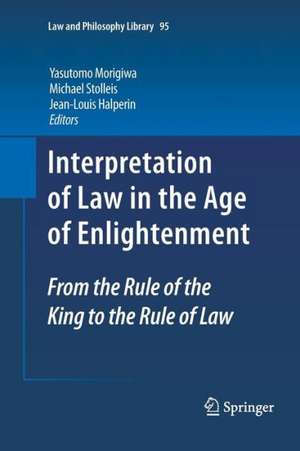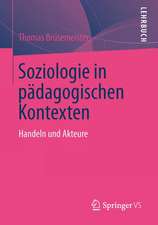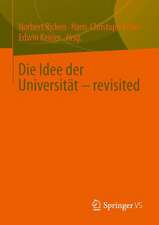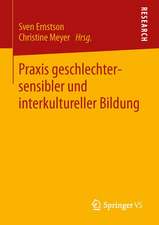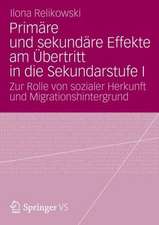Interpretation of Law in the Age of Enlightenment: From the Rule of the King to the Rule of Law: Law and Philosophy Library, cartea 95
Editat de Yasutomo Morigiwa, Michael Stolleis, Jean-Louis Halperinen Limba Engleză Paperback – 17 oct 2013
| Toate formatele și edițiile | Preț | Express |
|---|---|---|
| Paperback (1) | 553.79 lei 38-44 zile | |
| SPRINGER NETHERLANDS – 17 oct 2013 | 553.79 lei 38-44 zile | |
| Hardback (1) | 640.06 lei 43-57 zile | |
| SPRINGER NETHERLANDS – iul 2011 | 640.06 lei 43-57 zile |
Din seria Law and Philosophy Library
- 20%
 Preț: 813.11 lei
Preț: 813.11 lei - 20%
 Preț: 569.00 lei
Preț: 569.00 lei - 18%
 Preț: 1225.16 lei
Preț: 1225.16 lei - 18%
 Preț: 950.66 lei
Preț: 950.66 lei - 15%
 Preț: 583.43 lei
Preț: 583.43 lei - 15%
 Preț: 639.25 lei
Preț: 639.25 lei - 15%
 Preț: 641.53 lei
Preț: 641.53 lei - 18%
 Preț: 893.84 lei
Preț: 893.84 lei - 24%
 Preț: 797.39 lei
Preț: 797.39 lei - 15%
 Preț: 579.84 lei
Preț: 579.84 lei - 15%
 Preț: 644.95 lei
Preț: 644.95 lei - 18%
 Preț: 895.76 lei
Preț: 895.76 lei - 15%
 Preț: 644.95 lei
Preț: 644.95 lei - 20%
 Preț: 571.85 lei
Preț: 571.85 lei - 15%
 Preț: 642.03 lei
Preț: 642.03 lei - 18%
 Preț: 1232.26 lei
Preț: 1232.26 lei - 18%
 Preț: 1116.05 lei
Preț: 1116.05 lei - 15%
 Preț: 655.92 lei
Preț: 655.92 lei - 18%
 Preț: 833.54 lei
Preț: 833.54 lei - 18%
 Preț: 898.26 lei
Preț: 898.26 lei - 18%
 Preț: 1016.63 lei
Preț: 1016.63 lei -
 Preț: 390.25 lei
Preț: 390.25 lei - 24%
 Preț: 700.89 lei
Preț: 700.89 lei - 18%
 Preț: 999.60 lei
Preț: 999.60 lei - 18%
 Preț: 1115.77 lei
Preț: 1115.77 lei - 18%
 Preț: 1107.88 lei
Preț: 1107.88 lei - 15%
 Preț: 637.46 lei
Preț: 637.46 lei - 18%
 Preț: 781.94 lei
Preț: 781.94 lei - 24%
 Preț: 815.54 lei
Preț: 815.54 lei - 18%
 Preț: 786.18 lei
Preț: 786.18 lei - 18%
 Preț: 735.21 lei
Preț: 735.21 lei - 15%
 Preț: 653.33 lei
Preț: 653.33 lei - 18%
 Preț: 782.10 lei
Preț: 782.10 lei
Preț: 553.79 lei
Preț vechi: 692.24 lei
-20% Nou
Puncte Express: 831
Preț estimativ în valută:
106.00€ • 115.18$ • 89.10£
106.00€ • 115.18$ • 89.10£
Carte tipărită la comandă
Livrare economică 16-22 aprilie
Preluare comenzi: 021 569.72.76
Specificații
ISBN-13: 9789400737730
ISBN-10: 9400737734
Pagini: 216
Ilustrații: XIX, 193 p.
Dimensiuni: 155 x 235 x 11 mm
Greutate: 0.31 kg
Ediția:2011
Editura: SPRINGER NETHERLANDS
Colecția Springer
Seria Law and Philosophy Library
Locul publicării:Dordrecht, Netherlands
ISBN-10: 9400737734
Pagini: 216
Ilustrații: XIX, 193 p.
Dimensiuni: 155 x 235 x 11 mm
Greutate: 0.31 kg
Ediția:2011
Editura: SPRINGER NETHERLANDS
Colecția Springer
Seria Law and Philosophy Library
Locul publicării:Dordrecht, Netherlands
Public țintă
ResearchCuprins
Editors’ Preface; Morigiwa Yasutomo, Michael Stolleis, Jean-Louis Halpérin.- Foreword from the Herstec Project; Sato Shoichi.- About the Contributors.- I. Introduction.- Judicial Interpretation in Transition from the Ancien Régime to Constitutionalism; Michael Stolleis.- II. The case of France.- Legal Interpretation in France under the Reign of Louis XVI through the Gazette des Tribunaux; Jean-Louis Halpérin.- Legal Interpretation through the Case Law Book of the Parlement de Flandre; Serge Dauchy.- II. The case of Germany.- The Object of Interpretation: Legislation and Competing Normative Sources of Law in Europe during the 16th to 18th Centuries; Heinz Mohnhaupt.- The Concept and Means of Legal Interpretation in the 18th Century; Jan Schröder.- Necessity: Pandectists between Norm and Reality (1780-1870); Hans-Peter Haferkamp.- IV. The Nature of Legal Interpretation.- Interpretation by Another Name; Morigiwa Yasutomo.- What is Interpretation of the Law for the French Judge? Michel Troper.- The Craft of Interpretation ; Bradley Wendel.- Concluding Remarks.- Legal Interpretation in 18th Century Europe: Doctrinal Debates versus Political Change ; Jean-Louis Halpérin.- Index.
Textul de pe ultima copertă
This book examines the actual practice of the interpretation of law in the Age of Enlightenment versus the ideology of the Age and explains the reason for and difference between the two. The ideology of the Age of Enlightenment was that law, i.e., the will of the sovereign, can be explicitly and appropriately stated, thus making interpretation redundant. However, the reality was that in the 18th century, there was no one leading source of national law that would be the object of interpretation. Instead, there was a plurality of sources of law: the Roman Law, local customary law, and the royal ordinance. Yet, in deciding a case in a court of law, the law must speak with one voice, making interpretation to unify the norms inevitable. This book discusses the process involved and the role played by justification in terms of reason - the hallmark of Enlightenment.
Caracteristici
Unique interdisciplinary work in an unexplored field A collaboration of leading historians of European law Provides a missing link to those working in related disciplines. Historical reflection on how a governing ideology actually plays out in public institutions Provides important relevance to various disciplines related to textual interpretation
